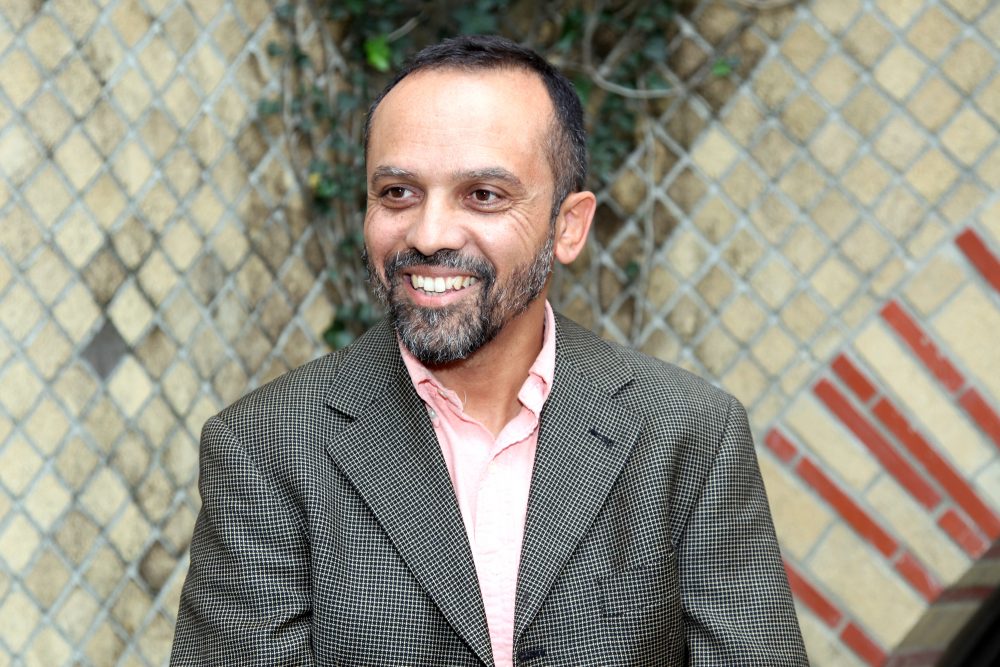
Photo by Aaron Salcido.
Grant Parker, a native of Cape Town, South Africa, is a classical philologist at Stanford University. Before joining a panel discussion for a Zócalo/Getty Villa “Open Art” event titled “What Can the Ancient World Teach Us About Globalization?” he chatted in the green room about strange public buildings, historical novels, and not believing everything you read.
What’s your happiest childhood memory?
Visits in the summer months to my aunt and uncle’s place in KwaZulu-Natal. This was Zululand. I grew up in a quite dreary suburb, and this was in the middle of this subtropical place where there were shades of green and a lot of fruit trees, mangoes, and pawpaws, that I hadn’t seen, and the leaves on the trees were enormously large, unlike in windswept Cape Town, with the tiny Mediterranean foliage. That’s a memory that I cherish.
What are you reading for pleasure?
I like to read South African novels, and it’s a very testing time in its history from the point of view of creative responses. So if there’s a new novel I try to get hold of it and read it. If it’s a historical novel my interest is especially strong, because I’m interested in collective memory, and in a historical novel we have more than one point of reference at the same time.
Was there a teacher who really changed your life?
An eighth grade English teacher, Neil Hayward, and a ninth grade history teacher, David Hiscock, who, in not quite as many words, got across the message, “Don’t believe everything you read.” That seems quite obvious when you put it in those terms. But to my teenage self, this was a major lesson to learn. And the idea that we should keep some kind of critical distance in taking in any kind of information and accepting any viewpoint was something that I’ve kept coming back to. And they really set me on the path of studying languages, literatures, and history.
As a kid, what did you want to be when you grew up?
I didn’t dare to dream of being an academic. But I simply stumbled from one step to the next of an academic career. I went to university thinking I would study law. At the time, legal studies required you to take Latin. I wasn’t so sure about law itself, but I was happy to take Latin.
And that led you into teaching about antiquity.
Absolutely. I’d studied Latin before, so I continued and I added Greek. High school Latin seemed like a crossword puzzle, just working out what the sentence meant. College Latin was a way of seeing into the hopes and fears of people far away in time and place. There was something especially attractive about that attempt to make that emotional bridge to people whom you would never see. And from time to time I’ve turned to this as a goal to hold onto.
Where do you take visitors to Cape Town, when you’re there?
I take them to the museums around the Company’s Garden. This is the oldest part of Cape Town as a colonial settlement. It has some very fine museums—the South African Museum, which is a natural history museum as well as an ethnographic museum, and the Slave Lodge, which was the building that housed the slaves from 1650 to around 1800. That’s a very problematic place to visit because it has been used since that time as various official buildings—it was the legislature, it was the supreme court, it was the post office, all kinds of strange things.
Do you have a favorite season in South Africa? I imagine the differences among seasons there are subtle, as they are in Southern California.
Yes, although Cape Town can have bad storms. The first European name was “Cape of Storms,” or “Tormentoso,” as the Portuguese called it. I last lived in Cape Town in 1989, but I’ve visited for several weeks of every year. Now I live in the San Francisco Bay area, which reminds me of the Cape—when I get away from the highways. So I continue to identify as a South African, all these years after having ceased to live there. I don’t regard myself as having emigrated, I just happen to be working in the U.S.



